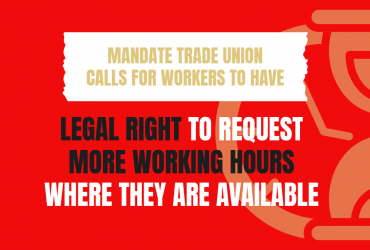Why we need to save the JLC System
Friday 1 July 2011Ireland is in the middle of the greatest economic crisis since the foundation of the State – a crisis caused by a culture of greed, stupid policy decisions and practically non-existent regulation of the financial system. The debate about how we tackle the crisis and who pays for it has been raging for some time. The Minister for Enterprise, Richard Bruton TD – cheered on by a host of employer groups – is proposing that hundreds of thousands of lower paid workers – whose terms and conditions are set by Joint Labour Committees (JLCs) – pick up a big part of the tab for the excesses of the Celtic tiger years.
Who exactly are we talking about? The workers involved include the chef that cooks the meal on your night out, the retail worker that helps you pick out that perfect suit or dress, the cleaner who makes sure your office is pristine for the next morning and the security guard who ensures everyone has a safe night out. It’s worth noting that the majority of people covered by JLCs are women, working hard to provide for their families in a time when traditional male sectors of employment have collapsed. With over 50% of these workers earning less then €10 per hour, they could hardly be described as overpaid.
So where did the debate about ‘reform’ of the JLCs come from?
The last Government, as part of the EU/IMF deal, agreed that an independent review of the JLC system be conducted and they appointed Mr Kevin Duffy, Chairman of the Labour Court, and Dr Frank Walsh, an economist from UCD, to conduct this review. After considering submissions from both employers and employees representatives and a wide range of other interested and affected organisations, the Duffy-Walsh unambiguously said that abolishing the JLC system or reducing the wages of low paid workers would not create additional jobs. However, they did make a number of proposals to modernise and streamline the system.
The report brought an objective analysis to a very complex area and was broadly welcomed by the trade union movement. However business groups have been very unhappy with the findings of the Duffy-Walsh report and have continued to demand the abolition of the JLCs in order to stimulate job creation.
It’s worth pointing out that the employers’ groups claims about the job creation potential of wage cuts for lower paid workers have been contradicted, not alone by the Duffy-Walsh report, but also by research which shows that such measures would in fact lead to the loss of a further 10,000 jobs in Ireland. This is because lower paid workers spend almost all their incomes in the domestic economy week in, week out, keeping local businesses float. When you add in the fact that the lower paid workers are the most vulnerable to price increases in areas such as rent, fuel and heating expenses, the employers’ demands for abolishing the JLCs make no sense at all.
However, further to the intensive lobbying by business groups, Minister Bruton published his own set of proposals for consultation with the employers and unions which went beyond those proposed by the independent Duffy-Walsh report. For example he proposed changes to the payment of premiums for those people who work on Sundays as well as to the higher pay rates for experienced workers.
So what exactly would it mean to ordinary workers if Minister Bruton managed to have his proposals approved by the wider Government?
SUNDAY PREMIUM
If Minister Bruton had his way, Sunday premiums would no longer be set on a sector by sector basis as they are now. Instead it would be up to employers and employees to arrange what extra payments or recognition would be due for working on Sundays. Unfortunately, this system would very much depend on the willingness of employers to act in a fair way. All workers in Ireland – whether they are bus drivers or office workers – are legally entitled to an additional payment for working Sundays. Sunday premiums are a fair and reasonable way of rewarding workers for unsocial hours. So why should the lowest paid, those who rely the most on the Sunday premium be denied this recognition?
Mandate member, Andrew McLoughlin said: “As a full time student, I don’t have the option to work midweek. I might only get one or two shifts a week and therefore the Sunday premium makes a huge difference to me. I need that money to pay my bills as well as the bread and butter stuff – it’s certainly not used for any extravagances.”
NO ‘EXPERIENCED’ RATES
Under the Bruton proposals, differences in pay rates for experienced staff would be eliminated. As it stands, for example, in the retail grocery trade, the JLC has set a three-point scale for various types of worker, with the maximum point of the scale being several percent above the minimum. This recognition of the added value experienced staff bring to workplaces would be removed under the Bruton proposals. As Andrew McLoughlin pointed out, “If people can’t look forward to promotions then that affects their motivation within the job.”
But the trade union movement’s concerns about the Minister’s proposed changes to the JLC system go beyond the fine print of what he is proposing. As Mandate member Leigh Speight, who works in a major British retail chain, said: “The existing system give workers a bit of protection. It allows workers who aren’t in, or aren’t allowed to be in a union, a bit of extra bargaining power against their employers. It’s hard to anticipate all of the actual effects of the Minister’s proposals on real workers until they are brought in. However, by then it could be too late”.
The good news is the trade union movement has not stood back and allowed Minister Bruton and the employers’ groups to have their way. Unions have campaigned in their own right and through the Coalition to Protect the Lowest Paid, a broad group of like minded organisations including MANDATE, SIPTU, UNITE, CWU, MRCI, the Community Platform, the National Women’s Council of Ireland, the Poor Can’t Pay Campaign and EAPN. The campaign has been very successful in garnering column inches in the media and driving widespread public and political support. Indeed, it has been so successful that the Minister seems to be ‘kicking the can down the road’ on the JLC issue until the autumn at least.
However, we need to continue to watch this space and ensure that Minister Bruton and his employer allies don’t get away with dismantling a system that has protected and looked after hundreds of thousands of low-paid workers.





